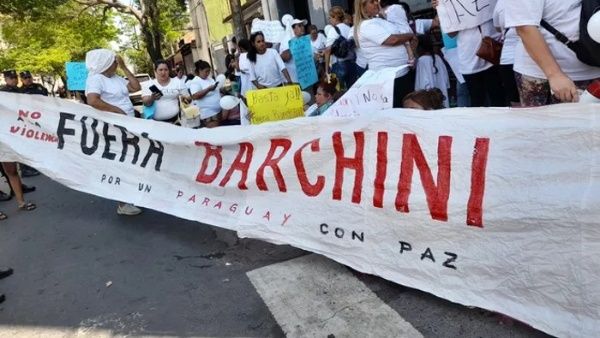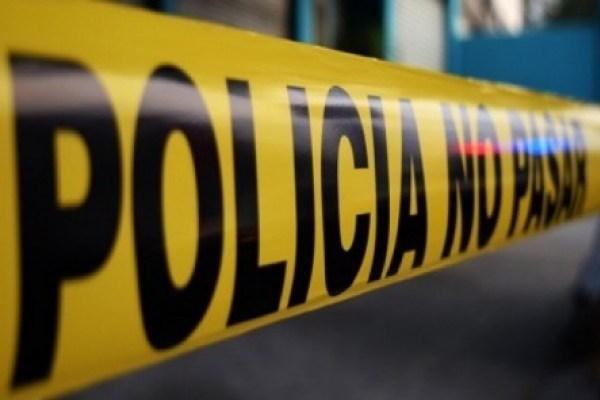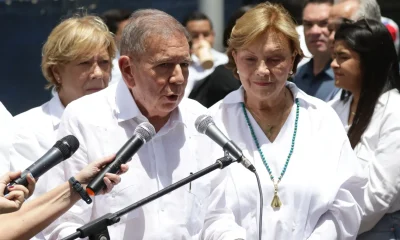International
Government says it does not have full control of Paraguayan prison

October 18 |
The Minister of Justice of Paraguay, Angel Barchini, acknowledged that they do not have full control of the country’s penitentiaries and in the specific case of the Tacumbú prison, admitted that there is an entire ward in charge of the inmates.
Barchini pronounced himself in these terms in a meeting that he held this Monday with prison officials of the Tacumbú prison.
The head of Justice spoke of the different claims and requests made by the prison guards. “They are demanding life insurance, which I consider absolutely fair and necessary due to the risk they run every day in the execution of their work”, he said.
According to the minister, “The use of technology, equipment, uniforms, weapons, provision of resources for the transfer of the penitentiaries. We were talking about a general problem of the functioning of the penitentiary centers”, he pointed out.
The Minister acknowledged that “Not everything is under control, we have a high risk that this situation that arose a few days ago continues to occur”, he said. He was referring to a riot that left the largest prison in the country in the hands of the inmates.
He acknowledged that, even today, “There is a sector of the prison that is in charge, the D pavilion”. He added that, nevertheless, “We want with our intervention and with the collaboration of our fellow prison officials to be able to regain absolute control of the penitentiary centers,” he said.
Regarding the situation of those responsible for prison security, the minister said that the officials remain firm in their position of not entering the Tacumbú penitentiary until they receive answers to their demands.
“They are going to stay outside because they have some fair demands,” he said.
The Secretary of State explained that 80 percent of the weapons in the Tacumbú penitentiary have been recovered, but it is still not known where the rest are, which are suspected to be in the hands of the inmates.
International
Football Fan Killed in Clashes After Colombian League Match

Fans of Cúcuta Deportivo and their traditional rivals Atlético Bucaramanga clashed outside the stadium following their local league match on Tuesday, leaving one supporter dead and several others injured.
The deceased fan was stabbed, according to a senior police official in Cúcuta who confirmed the cause of death in a video statement. Local media reported that the victim was a supporter of the visiting team, Atlético Bucaramanga.
The match ended in a 2-2 draw. Authorities had banned the entry of Atlético Bucaramanga’s organized supporters into the stadium in an effort to prevent disturbances.
Despite the restrictions, violence broke out in the surrounding areas after the game. Among the injured were three police officers, an institutional source told AFP.
The incident adds to a series of recent violent episodes linked to Colombian football. The most recent occurred in December, when supporters of Atlético Nacional and Independiente Medellín clashed in the stands and on the pitch, leaving 59 people injured.
International
Missing Spanish Sailor Rescued After 11 Days Adrift in Mediterranean

The man had departed from the port of Gandía, on Spain’s eastern coast, with the intention of reaching the southern Spanish town of Guardamar del Segura, a journey of about 150 kilometers, a spokesperson for Spain’s maritime rescue service told AFP.
Search boats and aircraft were deployed on January 17, but the operation was called off on January 22 after efforts proved unsuccessful. Alerts were then issued to vessels navigating the area in case they spotted any signs of the missing sailor.
As hopes were fading, a surveillance aircraft from the European Union’s border agency Frontex spotted the sailboat on Tuesday, along with a person signaling for help, approximately 53 nautical miles northeast of Bejaia, Algeria.
A nearby vessel, the Singapore-flagged bulk carrier Thor Confidence, carried out the rescue and is expected to bring the man to an end to his ordeal when it arrives on Thursday in the southern Spanish port city of Algeciras.
Maritime rescue services shared images on social media showing a small white sailboat drifting at sea and secured alongside the much larger ship.
It remains unclear how the sailboat ended up hundreds of kilometers off its intended route or how the man managed to survive for so long alone in open waters.
International
Rubio Says U.S. Could Participate in Follow-Up Russia-Ukraine Talks

The United States could join a new round of talks this week aimed at ending Russia’s invasion of Ukraine, Secretary of State Marco Rubio said on Tuesday.
Teams from Kyiv and Moscow met last Friday and Saturday in Abu Dhabi in their first publicly acknowledged direct negotiations to discuss the peace initiative promoted by former U.S. President Donald Trump.
“They are going to hold follow-up talks again this week,” Rubio told the Senate Foreign Relations Committee. “There could be U.S. participation.”
However, Rubio suggested that Washington’s role may be more limited than during last week’s discussions, which included Steve Witkoff, the president’s special envoy, and Jared Kushner, Trump’s son-in-law.
The secretary of state indicated that progress may have already been made on security guarantees for Ukraine, one of Kyiv’s key demands in any agreement with Moscow after nearly four years of Russian invasion.
“There is one remaining issue that everyone is familiar with, and that is the territorial claim over Donetsk,” Rubio said, referring to the eastern Ukrainian region that Russia wants Ukraine to cede.
“I know that active efforts are underway to see whether the positions of both sides on this issue can be reconciled. It remains a bridge we have not yet crossed,” he added during the hearing.
Rubio acknowledged that the territorial question would be particularly difficult for Ukraine to resolve.
-

 Central America2 days ago
Central America2 days agoGuatemala seizes over a ton of cocaine hidden in flour at Pacific port
-

 International4 days ago
International4 days agoTrump-Era Defense Plan Prioritizes Border Security and Scales Back Global Commitments
-

 International4 days ago
International4 days agoBogotá and Quito Seek Dialogue After Tariffs and Power Cut Escalate Tensions
-

 International3 days ago
International3 days agoDelcy Rodríguez seeks political agreements after Maduro’s ouster
-

 International2 days ago
International2 days agoSpain’s irregular migrant population rises to 840,000, study finds
-

 International2 days ago
International2 days agoHistoric snowstorm paralyzes Toronto after 60 centimeters of snow
-

 International3 days ago
International3 days agoFederal immigration agents kill man in Minneapolis, sparking protests and outrage
-

 Central America1 day ago
Central America1 day agoGuatemala Police Arrest Prison Guard Caught in the Act of Extortion
-

 Central America1 day ago
Central America1 day agoHonduras swears in conservative president Asfura after disputed election
-

 Central America1 day ago
Central America1 day agoBukele leads public trust rankings as UCA survey highlights gains in security
-

 International1 day ago
International1 day agoDoomsday clock moves to 85 seconds before midnight amid rising global risks
-

 International1 day ago
International1 day agoWinter Storm Fern Leaves 30 Dead and Over One Million Without Power Across the U.S.
-

 Sin categoría1 day ago
Sin categoría1 day agoEight Killed in Series of Armed Attacks in Ecuador’s Manabí Province
-

 International2 days ago
International2 days agoRights group says nearly 6,000 killed in Iran protest crackdown
-

 International1 day ago
International1 day agoSpain approves plan to regularize up to 500,000 migrants in Historic Shift
-

 International2 days ago
International2 days agoVenezuela frees at least 80 political prisoners, NGO says
-

 Sin categoría1 day ago
Sin categoría1 day agoEl Salvador Launches Fourth Year of Ocean Mission to Protect Marine Ecosystems
-

 International2 days ago
International2 days agoEU launches new probe into X over AI-generated fake nude images
-

 International2 days ago
International2 days agoSevere winter storm grips U.S., leaves multiple dead as extreme cold persists
-

 International2 days ago
International2 days agoFrance debates ban on social media for children under 15
-

 International1 hour ago
International1 hour agoMissing Spanish Sailor Rescued After 11 Days Adrift in Mediterranean
-

 International59 minutes ago
International59 minutes agoFootball Fan Killed in Clashes After Colombian League Match
-

 International1 hour ago
International1 hour agoRubio Says U.S. Could Participate in Follow-Up Russia-Ukraine Talks
-

 Central America57 minutes ago
Central America57 minutes agoGuatemala President Says Starlink Terminal Found Inside Prison






























